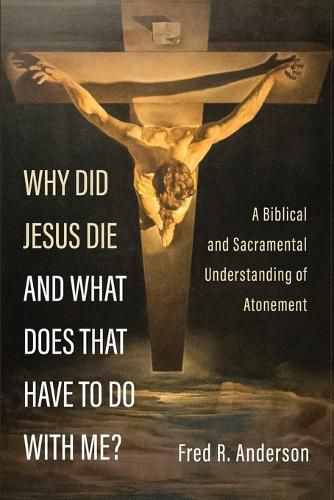Readings Newsletter
Become a Readings Member to make your shopping experience even easier.
Sign in or sign up for free!
You’re not far away from qualifying for FREE standard shipping within Australia
You’ve qualified for FREE standard shipping within Australia
The cart is loading…






This title is printed to order. This book may have been self-published. If so, we cannot guarantee the quality of the content. In the main most books will have gone through the editing process however some may not. We therefore suggest that you be aware of this before ordering this book. If in doubt check either the author or publisher’s details as we are unable to accept any returns unless they are faulty. Please contact us if you have any questions.
This book looks at atonement biblically, theologically, historically, and sacramentally. Biblically it is tied to Scripture's narrative of humanity's failure to fulfill God's intention and God's subsequent covenant with Abraham fulfilled in Jesus. Theologically, in Jesus the eternal Logos became incarnate to fulfill God's intention to deal with sin and begin again with a new creation. Jesus' death was not a payment for anything to anyone! It was the Triune God's non-violent way of absorbing, defeating, and overcoming sin and death for the world. Two chapters focus on sacrifice: how it functioned in Israel's life with God, how Paul and Hebrews use it, and how it thereafter took on pagan connotations. Historically, three chapters review the development of atonement theories through Gustav Aulen's Christus Victor. After reviewing atonement theologies of the last seventy-five years--especially feminist critiques of them--this retrieves Irenaeus and Athanasius, offering an understanding of atonement influenced by Baillie, Barth, Moltmann, Torrance, Von Balthazar, Tanner, and Weaver. Sacramentally, it describes how atonement is realized through the word, baptism, Eucharist, and prayer. Sacramental "atonement" nurtures those "in Christ" as members of God's new creation through Jesus' continuing high priestly ministry of atonement, until his final return.
$9.00 standard shipping within Australia
FREE standard shipping within Australia for orders over $100.00
Express & International shipping calculated at checkout
This title is printed to order. This book may have been self-published. If so, we cannot guarantee the quality of the content. In the main most books will have gone through the editing process however some may not. We therefore suggest that you be aware of this before ordering this book. If in doubt check either the author or publisher’s details as we are unable to accept any returns unless they are faulty. Please contact us if you have any questions.
This book looks at atonement biblically, theologically, historically, and sacramentally. Biblically it is tied to Scripture's narrative of humanity's failure to fulfill God's intention and God's subsequent covenant with Abraham fulfilled in Jesus. Theologically, in Jesus the eternal Logos became incarnate to fulfill God's intention to deal with sin and begin again with a new creation. Jesus' death was not a payment for anything to anyone! It was the Triune God's non-violent way of absorbing, defeating, and overcoming sin and death for the world. Two chapters focus on sacrifice: how it functioned in Israel's life with God, how Paul and Hebrews use it, and how it thereafter took on pagan connotations. Historically, three chapters review the development of atonement theories through Gustav Aulen's Christus Victor. After reviewing atonement theologies of the last seventy-five years--especially feminist critiques of them--this retrieves Irenaeus and Athanasius, offering an understanding of atonement influenced by Baillie, Barth, Moltmann, Torrance, Von Balthazar, Tanner, and Weaver. Sacramentally, it describes how atonement is realized through the word, baptism, Eucharist, and prayer. Sacramental "atonement" nurtures those "in Christ" as members of God's new creation through Jesus' continuing high priestly ministry of atonement, until his final return.